Holocaust Remembrance Must Include Jewish Strength, Not Just Jewish Suffering
Every year, on Yom HaShoah, the Jewish world stops to remember. Sirens wail. Candles flicker. Old black-and-white footage of skeletal men behind barbed wire plays on loop. Schoolchildren in neatly ironed shirts recite poems written by murdered children. We say “Never Again” like a prayer, or maybe a plea.
But somewhere in the middle of the solemnity and the silence, I can’t help but ask: what exactly is it that we’re remembering?
Because if we’re only remembering how we died, and not why we now live - strong, sovereign, and armed - then we’re doing remembrance wrong.
Yom HaShoah is not just a day of mourning; it should be a day of meaning.
And the meaning is this: Jews without power are a statistic. Jews with power are a country.
Why does Holocaust education so often forget to mention the sequel?
You know, the part where the Jews come back, build a country in the desert, revive an ancient language, defeat multiple invading armies, and invent the cherry tomato? Oh ya, and all in the span of just THREE YEARS after the Holocaust ended with one-third of world Jewry dead.
We tell the story of the Shoah with candles and violins, but tragically, and often, skip the part where the Jewish people - after being gassed, starved, and abandoned - decided that enough was enough. That we’d stop asking permission to exist. That we’d be done with waiting for the world to care.
And yet, most Holocaust education ends with a handshake, a speech about tolerance, and maybe a field trip to a museum gift shop. It doesn’t move to the next chapter: the chapter titled Israel, in big, bold, and blue letters.
Holocaust remembrance that forgets Israel is like a eulogy for someone who was just taking a nap. He then woke up, put on his running shoes, and ran a marathon.
“Never Again” is not a hashtag. It’s a doctrine of defense.
Let’s be blunt: Jews didn’t survive the Holocaust because the world learned its lesson. They survived because we are survivors, because we are stubborn, and because by 1945, Jews were already decades-deep into their plan of building a state where Jewish life isn’t negotiable.
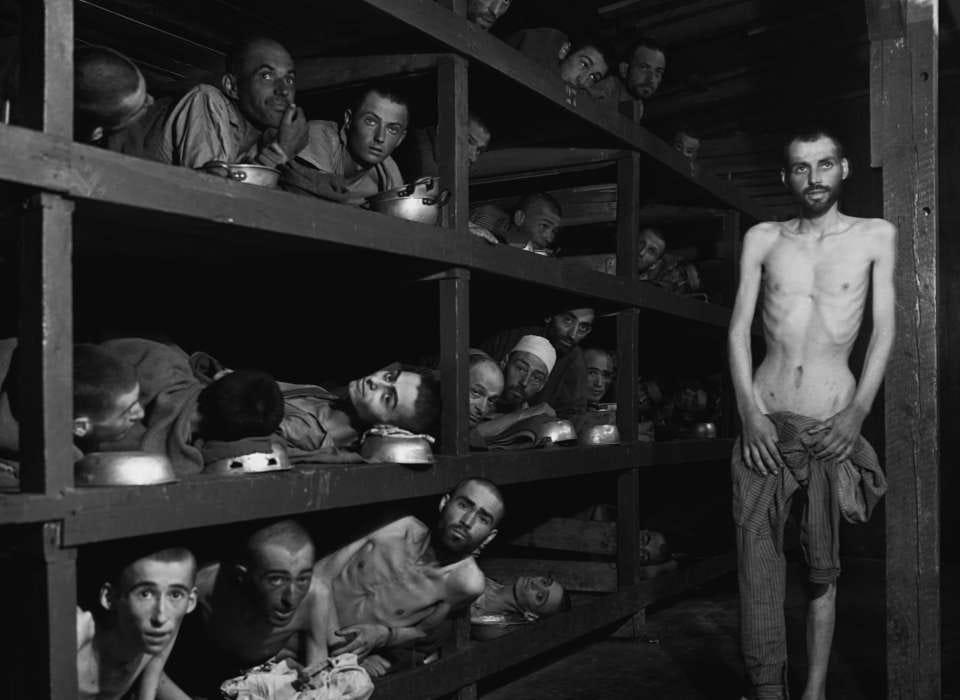
This is where it gets uncomfortable - because the world loves a helpless Jew, preferably in sepia tone. What it has more trouble with is the modern Israeli Jew: tan, armed, in an olive-green pressed uniform, and not particularly interested in apologizing for surviving.
Here’s a question: Why is it socially acceptable to weep at Auschwitz but not to support the IDF?
Why is the phrase “Never Again” inscribed on Holocaust memorials in countries that voted for 15 UN resolutions condemning Israel last year, and zero about Hamas or Hezbollah?
Frankly, you can’t light a candle on Monday and then call Zionism “colonialism” on Tuesday. Well—you can, but then don’t be shocked when I blow out your candle and ask if your moral compass came from IKEA.
Is remembering the Holocaust making us forget how to fight?
There’s a strange phenomenon in the Diaspora, especially among younger Jews, where Holocaust memory is being weaponized against Jewish power.
Somehow, the logic goes: because we were victims then, we must act like victims now. Forever. Because we were weak, we must always choose weakness. That we must be sorry for our success, and apologize for our thriving, the privilege which did not come easy. As if Jewish morality is a kind of compensation plan for past trauma.
This is both historically illiterate and morally backwards. Our ancestors didn’t survive the camps so their great-grandkids could post TikToks about “decolonizing Zionism.” So that 36 members of the Board of Deputies of British Jews could write a shameful letter condemning Israel’s actions in Gaza, for fighting a moral and just war to root out Israel’s enemies and rescue Jewish captives.
Our Holocaust-surviving ancestors survived so we could build a world where Jews don’t beg for scraps. Where we have borders, and teeth, and laser-guided missiles.
Survivors didn’t whisper “Never Again”: they said it loud, packed a bag, and moved to Israel.
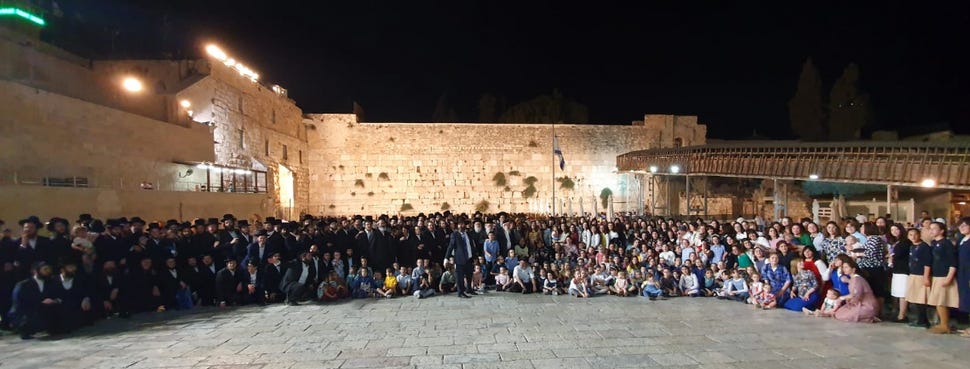
There is an interesting anecdote from the end of WW2, when in 1946, almost 19,000 Jewish refugees were asked by the United Nations Relief and Rehabilitation Administration (UNRRA - tasked with working out what to do with European Holocaust survivors) where they wanted to be resettled. Palestine - then under British control - was the first choice of 18,700 of the respondents. All 19,000 then wrote Palestine as their second choice. After they were told that they could not list the same choice twice, 5,000 of them wrote “crematorium” as the alternative. To so many of these survivors, Palestine - or what would soon be Israel - was the only option. With nothing left, Eretz Yisrael was home.
Israel is not a consolation prize. It’s the counter-punch.
It’s time we stopped treating the State of Israel as a kind of moral indemnity payment for the Shoah. Israel doesn’t exist because of the Holocaust!!! It exists because Jews were exiled, persecuted, and hunted for 2,000 years, and figured it was time to stop waiting for the sequel to be worse than the original. It exists because we have always dreamed of rebuilding a state in our ancestral homeland. It exists because of the endeavours of those members of the first, second, third, fourth, and fifth aliyot.
All the Holocaust did was tear off the last blindfold.
When people say things like “You can’t use the Holocaust to justify what Israel is doing,” I ask: Do you mean existing? Defending itself? Refusing to be herded again?
Because that’s what Israel is doing.
Zionism is the very act of getting rid of the need to justify ourselves. We don’t use the Holocaust to justify Israel, just as we don’t use the Holocaust to justify living, breathing, or having more children. We do that because that is how we continue to thrive as Jewish people.
Are we remembering too much death and not enough life?
We need to stop reciting the Mourner’s Kaddish without reminding ourselves why we still say Shehechiyanu too - the blessing for being alive, and for being brought to this very moment as Jews. We need to teach our kids not just about crematoria, but about courage in places like Entebbe, Argentina, Latrun, and Beit Hanoun. Not just about Warsaw’s walls, but about the Iron Dome. Not just about Kristallnacht, but the crystal skyscrapers in Tel Aviv. Not just about Anne Frank’s fear, but about Ilan Ramon’s flight. Not just about six million dead, but about the Six Day War. Not just about being hunted, but about being heroic.
Yes, the Shoah matters. It always will. And I am not seeking to diminish its importance in the Jewish narrative and our history. But remembrance without relevance is just nostalgia. And Jewish nostalgia is a luxury Jews can’t afford - not with Iran enriching uranium, and antisemitism wearing Birkenstocks, a nose-ring, and a keffiyeh on university campuses right here at home.
What’s the point of remembering, if we’re ashamed of surviving?
You want to mourn Jews who had no state, no army, and no escape? Fine. But don’t turn around and condemn the Jews who now have all three. You know exactly who you are JVP, IJV and other alleged “Jews” against “genocide.” That also goes for every single politician - Jewish and non-Jewish - who marks either Yom HaShoa today or Holocaust Remembrance Day in January, but who can’t bring themselves to utter a single word of condemnation against Hamas, Hezbollah, or Iran, who are *ahem* ACTIVELY SEEKING TO PERPETRATE ANOTHER HOLOCAUST. We don’t need or want your empty gestures today.
You want to donate money to a Holocaust museum or memorial? Fine, but then open up a new tab and donate three-times that amount to a Jewish day school or community centre that fosters Jewish life now, and that does not only serve to remember Jewish death.
You want to attend a Yom HaShoa rally? Excellent. But don’t miss this year’s Walk for Israel on May 25. You know what I thought when I saw that 50,000 Jews turned out at the Walk last year? That 150,000 of Toronto’s 200,000 Jews didn’t. We should all be walking, shoulder-to-shoulder with Israel this year, birthday parties, Sunday brunches, and sleep-ins be damned.
In 1951, the Israeli Knesset chose today - the 27th of Nissan - as Yom Hashoa Ve’Hagevurah - Holocaust and Heroism Remembrance Day. It was a date chosen to coincide not with the the Babi Yar massacre, or Kristallnacht, or a day when the most deaths were recorded at Auschwitz. It was selected to coincide - as closely as possible - with the heroic stand made by the Jews in the Warsaw Ghetto Uprising in 1943.
It was only in 1959 however that the Knesset actually voted to establish the day in Israeli law. Why did it take so long? In the early 1950s, education about the Holocaust emphasized the suffering inflicted on Europe’s millions of Jews. Surveys conducted in the late 1950s however indicated that young Israelis did not sympathize with the victims of the Holocaust, since they believed that European Jews were “led like sheep for slaughter.” The Israeli educational curriculum began to shift the emphasis to documenting how Jews resisted their Nazi tormentors through “passive resistance” - retaining their human dignity in the most unbearable conditions - and by “active resistance,” fighting the Nazis in the ghettos and joining underground partisans who battled the Third Reich in its occupied countries.
Thus, the day actually enacted as Yom HaShoa did not only have Jewish suffering in mind; it had Jewish heroism in mind too. This was more in line with what the nascent Jewish State of Israel was about.
Israel does not exist because of the Holocaust, but it is the answer to the Holocaust. You may not like the tone of this answer. It may not always be polite. It may sometimes punch first. It may bump you out of line waiting for a bus or a falafel.
But that’s what answers do when the question is annihilation.
So this Yom HaShoah, light your candles. Say your prayers. Tell the stories, read the books, and watch the movies. I know I will. But then turn your eyes Eastward. Toward a little country that refuses to die. Toward the flame that burns not just in memory, but in might.
Because the best way to honour the six million?
Ensure there’s never a seventh.
Am Yisrael Chai
The most powerful song I listen to each year on Yom HaShoa is the Partisan’s song (English lyrics provided below):
Never say you are going on your final road,
Although leadened skies block out blue days,
Our longed-for hour will yet come
Our step will beat out - we are here!
From a land of green palm trees to the white land of snow
We arrive with our pain, with our woe,
Wherever a spurt of our blood fell,
On that spot shall spurt forth our courage and our spirit.
The morning sun will brighten our day
And yesterday will disappear with our foe.
But if the sun delays to rise at dawn,
Then let this song be a password for generations to come.
This song is written with our blood, not with lead,
It is not a song of a free bird flying overhead.
Amid crumbling walls, a people sang this song,
With grenades in their hands.
So, never say the road now ends for you,
Although skies of lead block out days of blue.
Our longed-for hour will yet come -
Our step will beat out - we are here!

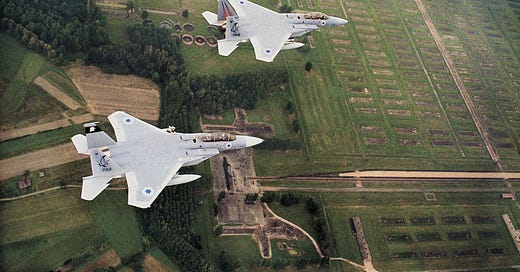


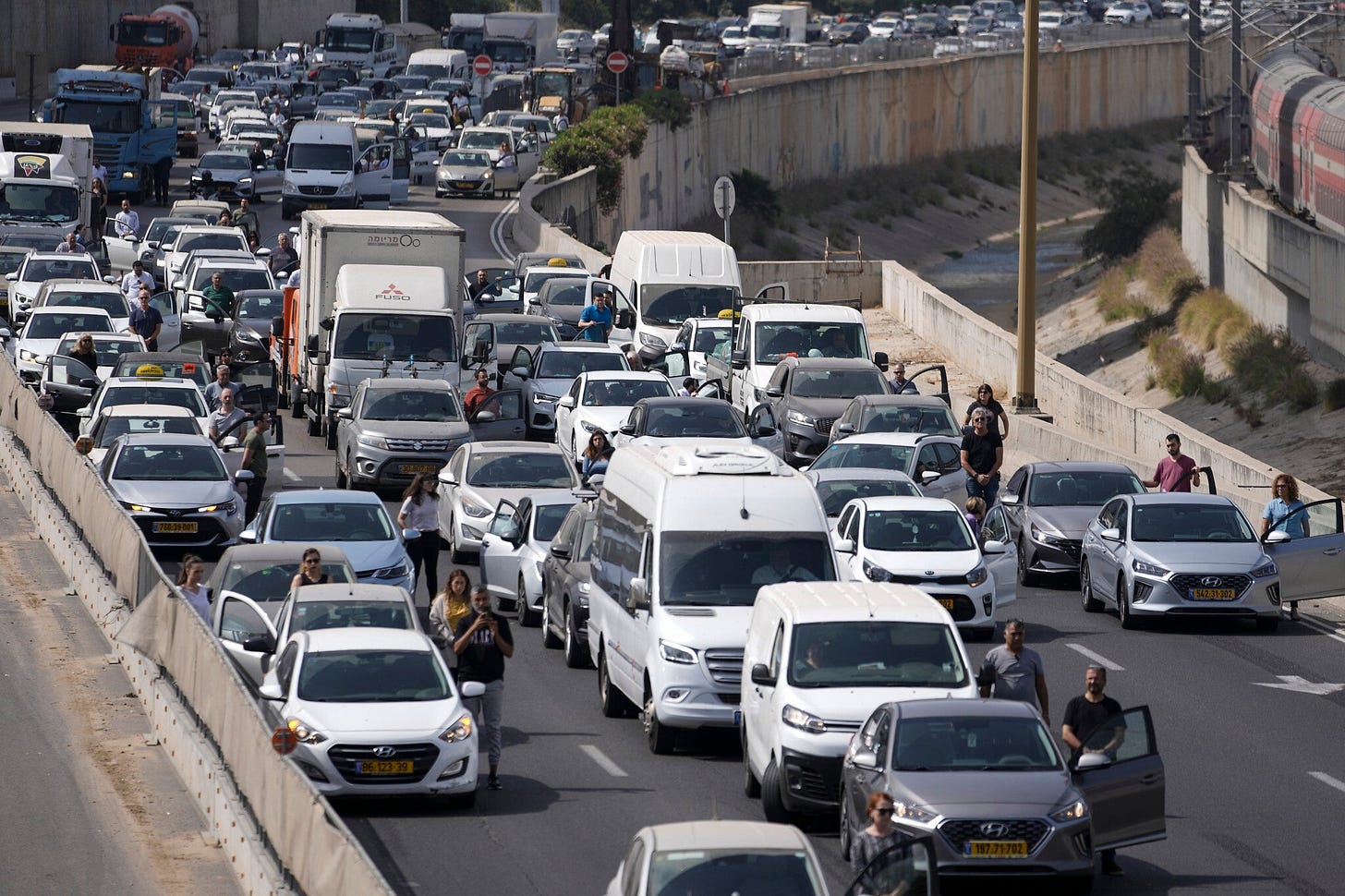


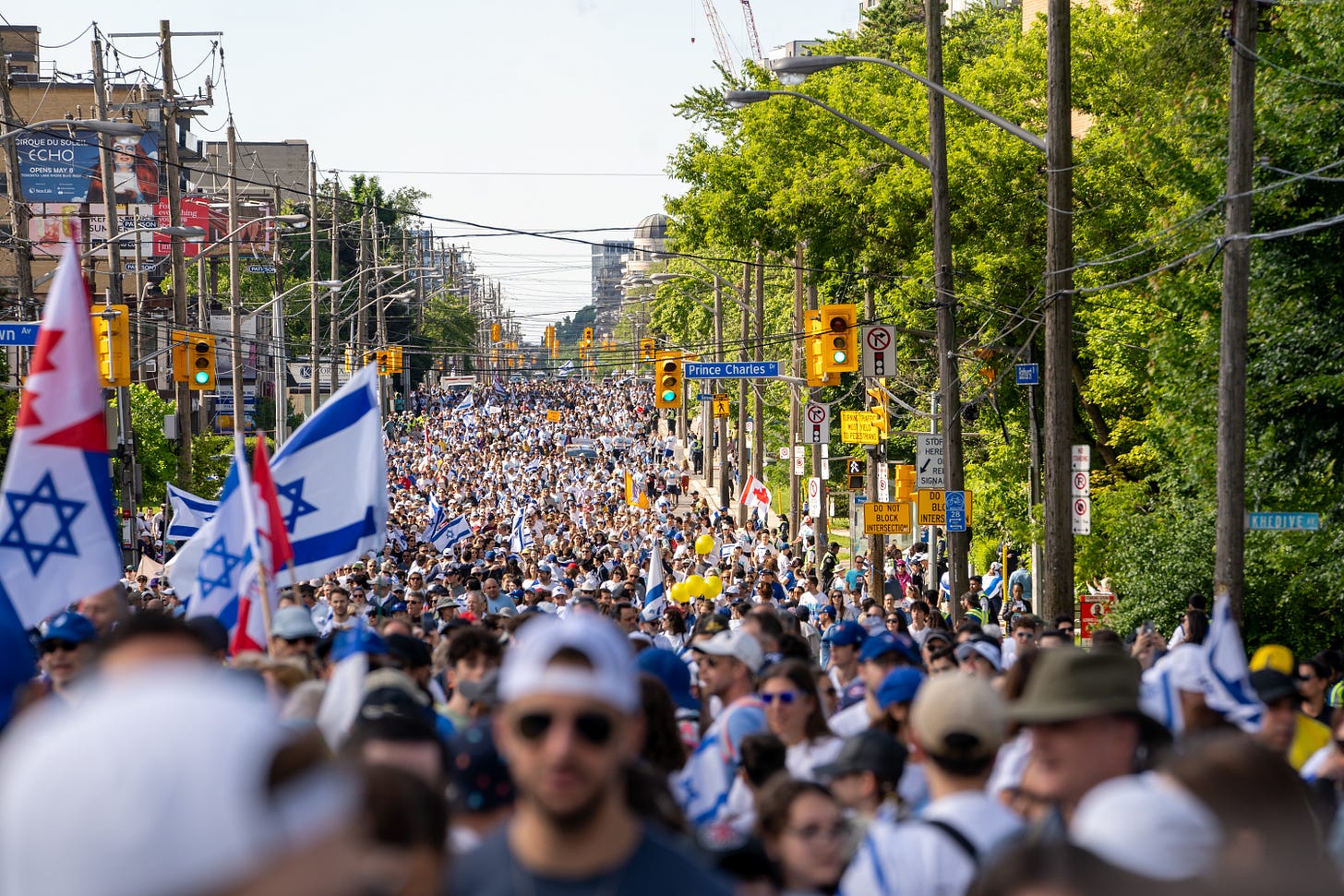
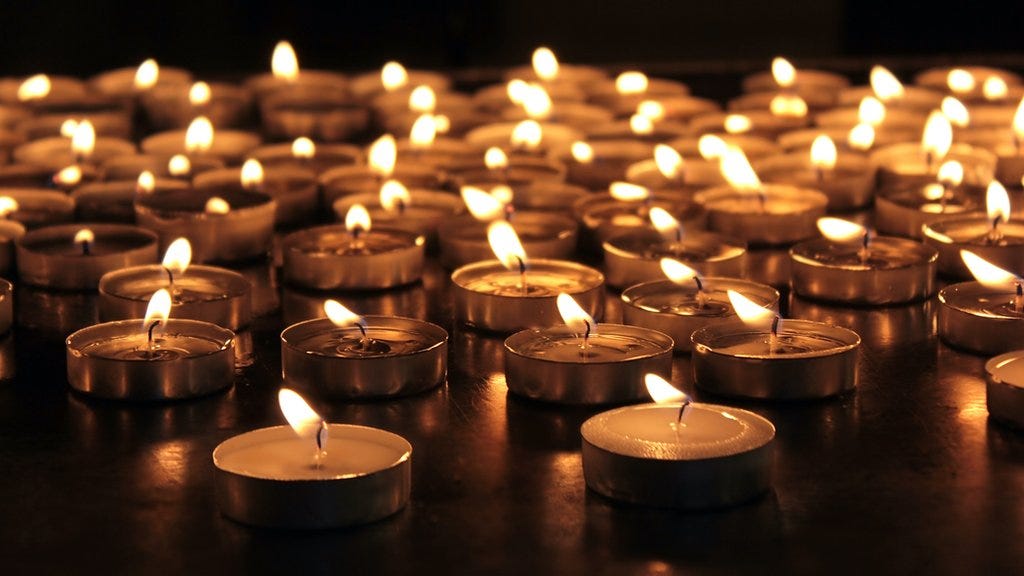
The holocaust did not end in 1945. It relocated south and east, to Israel. Muslim hatred was a large part of Hitler's holocaust and they are still hating and fighting. But those starving people wearing striped suits in faded photographs are not finished either. Now you Jews are armed and wearing fatigues. Why isn't the world CHEERING for you?!?!?
October 7th was a wake-up call but many are STILL snoozing. I recall feeling uncomfortable, to say the least, upon learning that so and so had gone to Israel to volunteer with the IDF, as if it were some shameful act. In March of 2024 I volunteered for 3 weeks with Sar El in Israel and never felt so proud of Israel and our people.